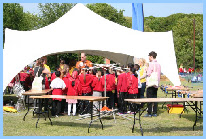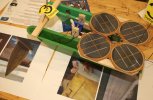© engineering your future -










- Marine Project Curriculum Support
Click here
Schools Marine Challenge
 An exciting engineering challenge focused on Students at Key Stage 3 & 4.
An exciting engineering challenge focused on Students at Key Stage 3 & 4.
What is the Schools Marine Challenge?
School teams link with a technology based company to design, build and race boats in three classes:
1. Powered by solar energy
Maximum LOA 450 mm
2. Powered by a petrol engine
Maximum LOA 850 mm
3. Powered by a battery driven engine
Maximum LOA 850 mm
Schools engineer their final solutions to score points in the following categories:
-
-
-
-
This innovative scheme introduces pupils at an impressionable age to the world of Marine Engineering. It dispels the myths surrounding the industry and lets young people experience at first hand, many aspects of teamworking in this environment.
Using the ‘shop window’ of Powerboat Racing as a context, participants work to a competition deadline.
Why take Part?
The United Kingdom's specialist Marine Engineering Industry is world class. Perspectives
of this industry from parents and career guidance are often not up to date, and based
on myths and mis-
What will I get out of it?
The Marine Challenge provides hardware and a context with supporting infrastructure
to offer and deliver engineering as an extra-
The scheme provides materials and specialist support for curriculum delivery of: GNVQ Engineering, Vocational GCSEs, GCSEs in Systems Control, Electronics and Resistant Materials.
Some of the activities supported by the scheme include:
- Composites materials Technologies and manufacturing
- Electro Mechanical Engineering projects
- Data capture from school engineered Dynamometers
- Construction of communication and marketing systems such as team Web Sites
- All this adds up to young people experiencing the application of scientific/technical skills and knowledge not available in mainstream education.
Developing skills in:
- Engineering
- Power train and hull Design
- Bodywork and Aerodynamics
- Composites
- Electronics
- Team working
- Driving








